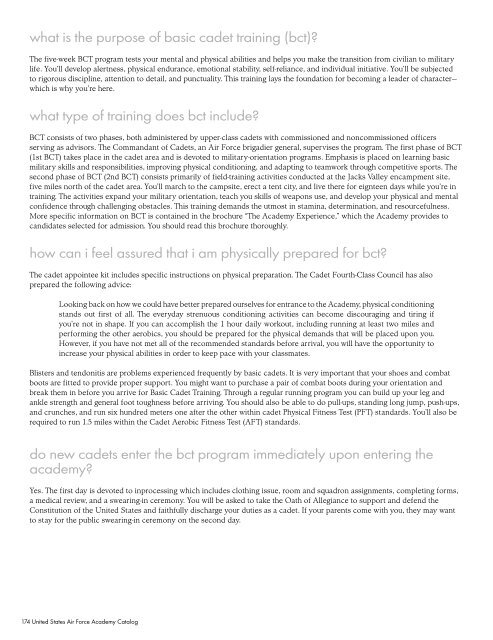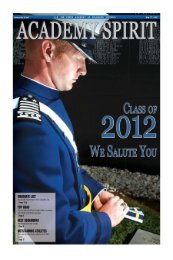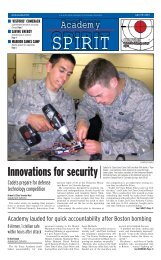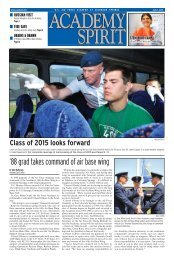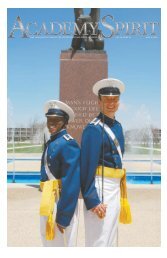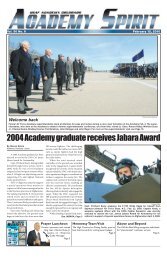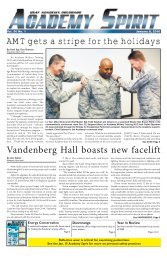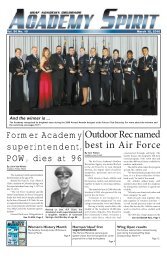2008-2009 Catalog - United States Air Force Academy
2008-2009 Catalog - United States Air Force Academy
2008-2009 Catalog - United States Air Force Academy
You also want an ePaper? Increase the reach of your titles
YUMPU automatically turns print PDFs into web optimized ePapers that Google loves.
what is the purpose of basic cadet training (bct)?<br />
The five-week BCT program tests your mental and physical abilities and helps you make the transition from civilian to military<br />
life. You’ll develop alertness, physical endurance, emotional stability, self-reliance, and individual initiative. You’ll be subjected<br />
to rigorous discipline, attention to detail, and punctuality. This training lays the foundation for becoming a leader of character—<br />
which is why you’re here.<br />
what type of training does bct include?<br />
BCT consists of two phases, both administered by upper-class cadets with commissioned and noncommissioned officers<br />
serving as advisors. The Commandant of Cadets, an <strong>Air</strong> <strong>Force</strong> brigadier general, supervises the program. The first phase of BCT<br />
(1st BCT) takes place in the cadet area and is devoted to military-orientation programs. Emphasis is placed on learning basic<br />
military skills and responsibilities, improving physical conditioning, and adapting to teamwork through competitive sports. The<br />
second phase of BCT (2nd BCT) consists primarily of field-training activities conducted at the Jacks Valley encampment site,<br />
five miles north of the cadet area. You’ll march to the campsite, erect a tent city, and live there for eignteen days while you’re in<br />
training. The activities expand your military orientation, teach you skills of weapons use, and develop your physical and mental<br />
confidence through challenging obstacles. This training demands the utmost in stamina, determination, and resourcefulness.<br />
More specific information on BCT is contained in the brochure “The <strong>Academy</strong> Experience,” which the <strong>Academy</strong> provides to<br />
candidates selected for admission. You should read this brochure thoroughly.<br />
how can i feel assured that i am physically prepared for bct?<br />
The cadet appointee kit includes specific instructions on physical preparation. The Cadet Fourth-Class Council has also<br />
prepared the following advice:<br />
Looking back on how we could have better prepared ourselves for entrance to the <strong>Academy</strong>, physical conditioning<br />
stands out first of all. The everyday strenuous conditioning activities can become discouraging and tiring if<br />
you’re not in shape. If you can accomplish the 1 hour daily workout, including running at least two miles and<br />
performing the other aerobics, you should be prepared for the physical demands that will be placed upon you.<br />
However, if you have not met all of the recommended standards before arrival, you will have the opportunity to<br />
increase your physical abilities in order to keep pace with your classmates.<br />
Blisters and tendonitis are problems experienced frequently by basic cadets. It is very important that your shoes and combat<br />
boots are fitted to provide proper support. You might want to purchase a pair of combat boots during your orientation and<br />
break them in before you arrive for Basic Cadet Training. Through a regular running program you can build up your leg and<br />
ankle strength and general foot toughness before arriving. You should also be able to do pull-ups, standing long jump, push-ups,<br />
and crunches, and run six hundred meters one after the other within cadet Physical Fitness Test (PFT) standards. You’ll also be<br />
required to run 1.5 miles within the Cadet Aerobic Fitness Test (AFT) standards.<br />
do new cadets enter the bct program immediately upon entering the<br />
academy?<br />
Yes. The first day is devoted to inprocessing which includes clothing issue, room and squadron assignments, completing forms,<br />
a medical review, and a swearing-in ceremony. You will be asked to take the Oath of Allegiance to support and defend the<br />
Constitution of the <strong>United</strong> <strong>States</strong> and faithfully discharge your duties as a cadet. If your parents come with you, they may want<br />
to stay for the public swearing-in ceremony on the second day.<br />
174 <strong>United</strong> <strong>States</strong> <strong>Air</strong> <strong>Force</strong> <strong>Academy</strong> <strong>Catalog</strong>


